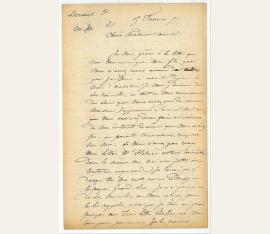French actor (1819-1874). 3 autograph letters signed. Paris and n. p. 8vo and 12mo. Together 13 pp. With 1 autograph address.
$ 3,740 / 3.500 €
(88510/BN58372)
Highly interesting letters to a friend called Madame Bergerat in Veules-les-Roses, Normandy, relating news about the difficult situation in Paris during the Franco-Prussian War and the Paris Commune. - In the earliest letter from 11 September 1870, only nine days after the decisive Prussian victory at Sedan, Leroux informs Bergerat that he will not go to Veules due to the situation in Paris and thanks her for taking care of a tenant. Concerning the war, Leroux mentions that his son Georges, a surgeon, could not reach Sedan, as the bridges have been destroyed, and has returned to Paris, expecting his unit to be deployed in the "Seine basin, that means between two fronts!".
The Comédie Française has "metamorphosed into an casualty department", and Leroux speculates that he will have to flee from the Prussian shells, expecting the fortifications near Boulevard Pereire to be to bombed. Enclosed with the letter is an inventory of household goods that Leroux had sent to Veules (12mo, 2 pp.). - The second letter is written on 15 February 1871, soon after the ratification of the Armistice of Versailles on 28 January that ended the Prussian siege of Paris. Leroux describes his experiences in Paris and the fate of his sons Georges and Maurice: "The privations of all kinds, the hunger, the bread that my dog would refuse, the cold! Nothing was comparable to the anxieties that we endured when we heard (and it was incessant) the rumbling of the cannons! Each of us told ourselves to which of our sons this blow must have been fatal! God saved them for me, made men out of them, as I told you". Georges served under general Joseph Vinoy in the defence of Paris "and was noticed for his courageous and energetic conduct in all circumstances". To his father's "great regret", the younger son Maurice, who was only seventeen and a half at the time, had volunteered for an infantry unit that "was decimated at Bourget and Stains, and shelled at the last moment at Saint Denis". Maurice returned as a prisoner of war "interned in Paris, waiting for the results of the peace negotiations and generally little afraid of the perspective of being sent to Germany!" In a postscript, Leroux urges the recipient: "Write us! Write us! Maybe tomorrow you cannot do so anymore, who knows! Write us, write us". - The final letter from 12 Mai 1871 is a document of the final days of the Paris Commune. Georges has left Paris after having been forbidden "by order" to "give his care to the people of Versailles" even though he was a member of the "Société internationale de secours". This probably refers to the two failed attempts by the Communards to take Versailles on 2 and 3 April. Prisoners taken by the French army were summarily shot. At this point, Paris was again under siege: "You are probably aware that the fort of Issy has fallen and of the imminent [fall] of Vanves [...]. My poor area is invaded by these people from Belleville and Montmartre, the [artillery] fire is still incessant, grenades fall from all sides! Just yesterday evening at 5 my house was spared. I try to ignore what could have happened that night, God protect us!" Leroux kept the Comédie Française open "during the two sieges" in order to make a living, but most sociétaires had left Paris: "M.lle Nathalie and I are the only sociétaires present; together with some pensioners we keep the house open to the great satisfaction of the Commune and to the greatest detriment of our interests ... we make no money, there are no Parisians left in Paris, it is a wasteland [...]". Mademoiselle Nathalie (1816-86) is today best known for her conflict with the young Sarah Bernhardt. - Some browning and minimal foxing. With collector's notes in pencil..
